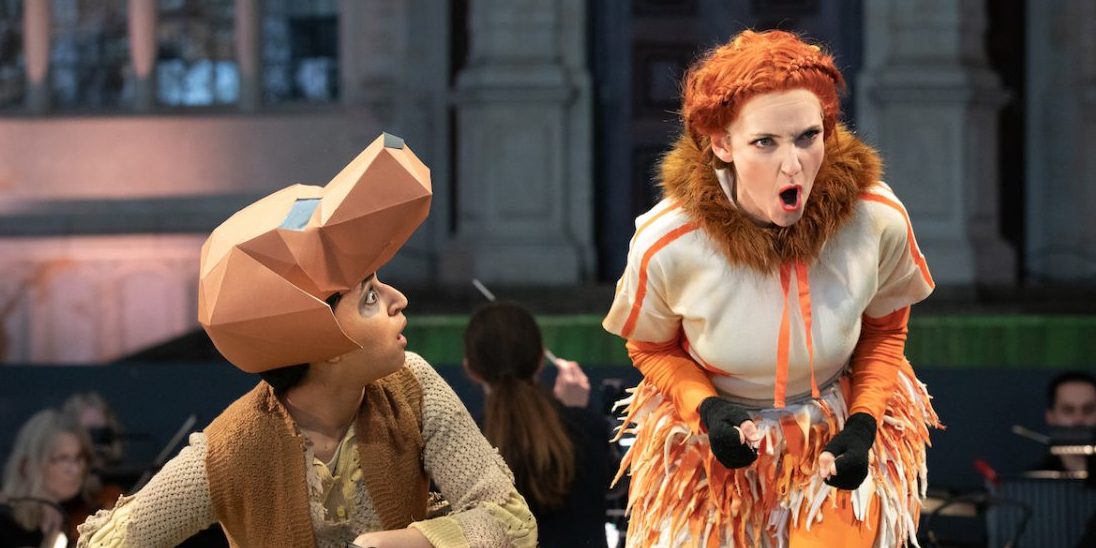Rather like ‘The Marriage of Figaro’, this opera is fairly indestructible in any production. As environmental awareness has grown so this parable about man and the natural world has acquired even greater salience. But even if you put the message to one side, it can work equally well simply as a fairy story about the cycle of nature, full of humour and charm. That can appeal to all ages, and offer roles and opportunities for performers of all ages. It is rare that both aspects of its appeal are well blended in the same production and here director Stephen Barlow succeeds in memorably fusing each aspect.
The twilight glimmers of Holland Park are of course an ideal setting for this sort of fairy tale in a forest, and the mood is set immediately in the orchestral prelude as masked children rush on through the audience waving lantern streamers and impersonating insects and animals. The rest of the work is done by Janáček’s unique score, here in the chamber reduction by Jonathan Dove, which combines lyrical intensity and rhythmic quirkiness. None of this is easy though, and great credit belongs to Jessica Cuttis in the pit, who set the tone for the evening by managing the quicksilver changes of mood and tone with incisiveness and flair, assisted by some virtuosic playing particularly from the brass and woodwinds.
In this tale of a young vixen’s adventures in the forest and ultimately fatal encounters with humans there is a reversal of expectations. It is the animals that have fully developed anthropomorphised personalities and the humans who are – mostly – two-dimensional stereotypes. So, a lot depends on how the vixen herself is presented, and here the director and lead singer (Jennifer France) show originality in developing her feminist credentials, both in feisty exchanges with her human ‘frenemy’, the Forester, and in the elaborate courting scene with the Dog Fox, a cheerfully swaggering Julia Sporsén. There is justification for this approach in the text and score, and it went down a treat with today’s audience too.
Everyone needs good acting skills in this piece as well as variety and agility of movement. Characters are shot, get drunk and fall over, and we get to witness a chicken massacre (very elegantly achieved here) and a poacher at work, together with the full buzzing, whirring, and seething of the forest world, and joyful wedding dance. Credit should therefore go to Sarita Piotrowski, the movement director, in making full use of this year’s stage walkway to real inventive effect. All the performers deliver irrespective of age.
There are no weak links in the cast or chorus, but a few performances really stand out. As indicated, Jennifer France embodies the vixen’s feisty vitality and energy with conviction, and indeed all the animal roles are well sung, with clear diction and acting that reveals personality. Many of these roles are little vignettes, similar to Ravel’s achievement in the contemporary ‘L’Enfant et Les Sortilèges, and a performer only has a few minutes to make their mark. It is very good to see everyone hit the mark.
Like the Forester, Grant Doyle has the right blend of world-weariness and peasant cunning. The opera culminates in a wonderfully elegiac reflection of the unceasing cycle of life to which the Forester opens his heart. But this only works as it should if the character grows through the opera. He should not be too cuddly and beneficent at the start: he needs to come to a recognition of the harm he has done. Doyle covers this arc well and is equal to the vocal challenges the role presents.
In comparison with the scenes set in the forest, the contrasting interior episodes located in the village tavern are under-characterised, somewhat the victim of the minimalism enforced on this year’s productions by outside circumstances. But all the same, there are some well-crafted performances, especially from Charne Rochford as the doleful Schoolmaster and the John Savournin as the anxious, unhappy priest. Chuma Sijeka’s brutal poacher is a useful antidote against any hint of sentimentality in this opera’s view of man and nature.
While it is hard to fail with this opera, it is even harder to really do justice to its many layers of meaning. This production succeeds where many do not.

